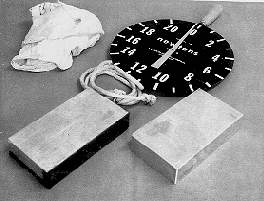

PURPOSE: To show the effect on frictional force of (a) velocity, (b) normal force, and (c) contact area.
DESCRIPTION: The spring scale is connected by the rope to the friction block, which has one of its felt-covered sides contacting the table. Pull with the rope parallel to the table so that the spring scale is visible to the class. Several features of frictional force are demonstrated as follows: (1) Static versus sliding friction, by slowly increasing the pulling force until the block begins to move. The force required to keep the block moving at a constant slow velocity is less than the force required to break the static friction and start the block in motion. (2) The frictional force doubles when a second block of equal mass is placed on the sliding block. (3) The frictional force is approximately independent of contact area, which can be demonstrated by turning the block so that it rests on the narrow felt surface and repeating experiment 1.
SUGGESTIONS: Practice may be necessary. Clean the surface so that the frictional force is not reduced by lots of dust.
REFERENCES: (PIRA 1K20.00)
EQUIPMENT: Two aluminum blocks, one having felt on two sides, spring scale with handle, rope, cleaning rag.
SETUP TIME: None.
 |  |
 |  |
 |